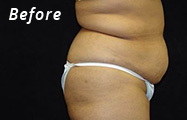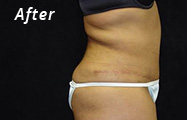Most doctors who perform plastic surgery advertise. Unfortunately, not all surgeons that advertise “cosmetic surgery” are plastic surgeons! If an advertisement doesn’t say “plastic surgeon” then they probably are not! “Cosmetic Surgeon” does not necessarily mean plastic surgeon. If an advertisement says “cosmetic surgeon”, they might be a plastic surgeon who specializes in cosmetic surgery, but they might also be a gynecologist, dermatologist, family practitioner, general surgeon or even your dentist. That’s right even dentists have expanded their practice to facelifts , eyelids , BOTOX and even liposuction . What most people don’t understand is that any physician or medical doctor can call themselves a “cosmetic surgeon”. But, they cannot call themselves a “plastic surgeon” unless they have actually completed a plastic surgery residency or fellowship training program. The fact is that for a doctor to call themselves a cosmetic surgeon you do not need to have any training in plastic surgery or formal training in surgery of any kind for that matter. All you need is to be an M.D.!
I believe the problem stems back to the decline in insurance reimbursement to most physicians practicing family medicine, dermatology, ENT, general surgery, dentists, ophthalmologists, general practitioners, OB/ Gyns, etc. Many physicians are, therefore, looking to supplement their income and are branching out into the world of cosmetic medicine. Unfortunately, there are no regulations to stop them.
The Importance of Using a Plastic Surgeon
Traditionally, cosmetic surgeries such as facelifts, tummy tucks , rhinoplasties (nose jobs) , liposuction, etc, have been performed by plastic surgeons. Plastic Surgeons spend a minimum of 5-7 years training in surgery of the entire body, learning surgical techniques and gaining a comfort level with body anatomy that you can’t get from a text book or a weekend course. Unfortunately, many physicians who are trained in other specialties are driven to do the “All you need to know about liposuction in a nutshell” type of course, and then call themselves “cosmetic surgeons” and perform these procedures on the unknowing public.
An example of why it is important to use a board-certified plastic surgeon, is in the area of liposuction and fat transfers. There is a big trend today for individuals who feel their backside is flat, to enhance their butt so that it is fuller and shapelier. One of the best ways to achieve this is through a fat transfer process, otherwise known as a Brazilian Butt Lift. However, some surgeons who are not educated in plastics, may offer butt injections and use a silicone-based substance to enhance the butt. This not only poses major risks, the results are almost always unsatisfying for the patient. A skilled plastic surgeon who is expertly trained in liposuction and the fat transfer/fat grafting process will use this technique properly to create gorgeous, healthy, and lasting results. The difference between the two scenarios is night and day.
Another example comes to us from the Dominican Republic where a U.S. woman traveled to have liposuction performed and ended up dying as a result. Liposuction is one of the most commonly performed plastic surgery procedures available, and while complications are always a risk with surgery, that risk should always be minimized by seeking a properly trained, board certified, and experienced plastic surgeon.
Plastic Surgery Training Is Rigorous
Most medical/surgical specialties are governed or regulated by the American Board of Medical Specialties (AMBS). This is the board that gives certification to all of the recognized medical and surgical specialties, of which “cosmetic surgery” is not one! These specialties include plastic surgery, general surgery, dermatology, otolaryngology (ENT), family practice, internal medicine, etc. To become board certified, you must complete a residency training program in one of these specialties and pass a comprehensive board certification examination of your knowledge of that specialty. And, as mentioned before, there is no board certification exam given or approved by the A.B.M.S. for cosmetic surgery because there is no residency training program for “cosmetic surgery”. This is part of plastic surgery training.
Cosmetic surgery training has always been a part of plastic surgery training, so the terms “plastic surgeon” and “cosmetic surgeon” were considered one and the same. But today this may not be true. So when you are looking for a “plastic surgeon” to do your cosmetic surgery, be sure he/she is really a plastic surgeon and board certified in Plastic Surgery.
Why Board Certification Matters
There is another issue that is misleading when cosmetic surgeons advertise:
John Smith, M.D.
Cosmetic Surgeon
Board Certified
You may be lead to believe this is a board-certified cosmetic surgeon but in reality as previously mentioned, the ABMS does not have a “cosmetic surgery” board certification. Dr. Smith is most likely board certified in one of the other specialties recognized by the A.B.M.S (dermatology, otolaryngology, family practice, internal medicine, general surgery, etc). Which one is he certified in? You probably will not find out unless you ask. Plastic surgeons usually very openly and proudly display that we are plastic surgeons and that our board certification is in plastic surgery which includes training in cosmetic surgery.
Making The Safe Choice
The choice is yours. When looking for a “cosmetic surgeon,” you can choose a plastic surgeon trained in cosmetic surgery or you can choose a physician who trained for years in another specialty to do your cosmetic surgery.
You shouldn’t choose my office for your medical check-up, gyn exam, pap smear, high blood pressure treatment, allergies, aches and pains, diabetes treatment, hemorrhoids, runny nose, etc. As an M.D., I could treat you for those problems too, but they are not my specialty.




.png)






